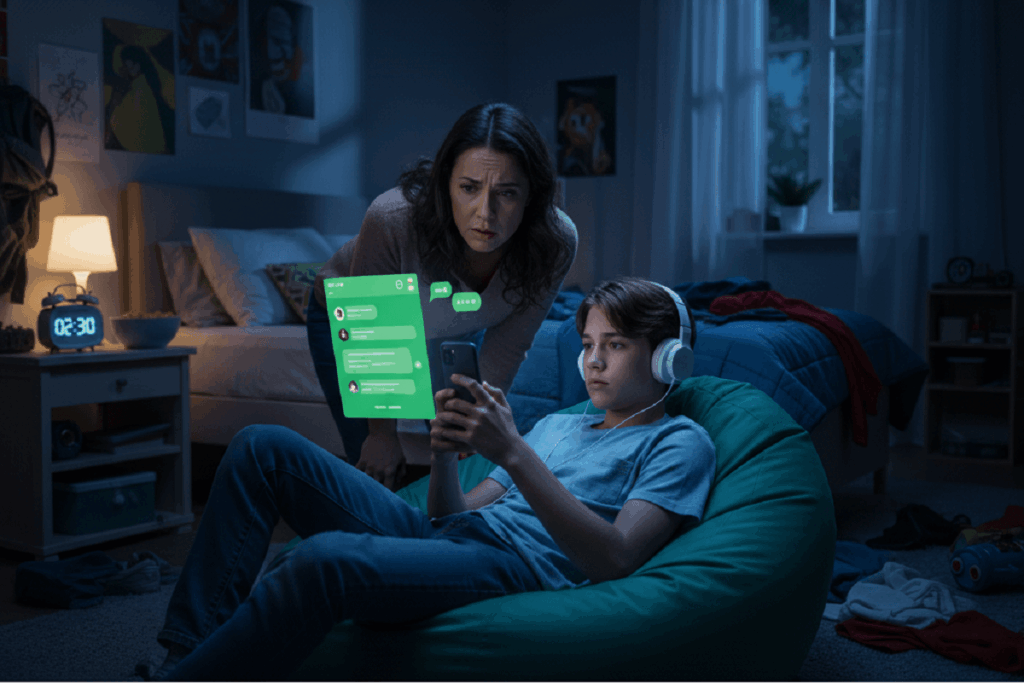
Every parent of a teenager discusses this at some point: “My teen is always online on WhatsApp.” Messaging apps are among the most discussed ones that today’s teens spend the most time using to talk, share, learn, laugh, and build friendships.
But as a parent, when you constantly see ‘online’ under their name, it’s worrying. A child always being on WhatsApp is every parent’s concern, and it’s an undeniable fact.
This article helps parents understand their child’s behaviour, address common concerns, and learn how a WhatsApp tracking app can help students develop safer digital habits.
Why Teens Spend So Much Time on WhatsApp
Currently, WhatsApp is more than just a messaging app for teens; rather, it is a social world for them. Multiple group chats for schoolwork, friends sharing memes, hobbies, and various community updates all happen in real-time. Teens also experience the FOMO (fear of missing out). Furthermore, they feel that if they do not respond quickly, they will miss conversations, which brings them back online repeatedly.
When parents track WhatsApp activity of teens, it helps them to understand why the WhatsApp matters to them.
Signs Your Child’s WhatsApp Usage May Be a Concern

Being active on WhatsApp is normal, but some parents find it concerning when they notice unusual patterns in their child’s use of the platform. Such patterns are some early indicators of stress or negative influence. Furthermore, some warning signs include frequent late-night chats that often disrupt sleep, poor grades due to severe distraction, sudden secrecy with their phone, rapid mood changes after texting, or even a slow withdrawal from offline activities.
In such cases, parents always show concern, asking, “Can WhatsApp be monitored by parents”?
Well, it is possible. So, if you notice these changes, you may consider using a tool that lets you track WhatsApp activity online. These insights can help you understand when your child is constantly engaged and whether they have to balance their routine.
Understanding Teen Behaviour and Communication Habits
Teens today feel much more comfortable texting than talking. They feel messaging is safer, quicker, and less emotionally intense; it also becomes highly influenced by proper online validation, such as likes, reactions, and read receipts. To them, WhatsApp is a great place where conversations feel much easier and engaging.
This is why a balanced parent guide to teen WhatsApp behaviour is very crucial. As a parent, your role is not to control their digital life, but to guide them properly. Balanced parenting means being informed about your child’s behaviours and patterns. Many families use a WhatsApp tracking app or consider downloading a WhatsApp tracker app to stay aware of screen behaviour.
Can WhatsApp Be Monitored by Parents Safely?
Yes, but as a parent, how you monitor it actually matters. There’s a significant difference between spying and focusing on ethical digital supervision for the betterment of society. Invasive monitoring, such as reading private messages without consent, can break the bond with kids, affecting trust and pushing teens away. At the same time, ethical tracking focuses on safety, screen-time patterns, and superior wellbeing, rather than prying into personal conversations.
Here, TiSPY’s WhatsApp Tracking App is safe, primarily developed with the philosophy in mind. It also allows parents to track WhatsApp activity securely. Similarly, different features such as screen-time logs, activity duration, and proper usage alerts also help parents understand behaviour patterns.
For families wondering, “Can WhatsApp be monitored by parents safely?” The answer is yet. TiSPY is such a tool that offers a transparent and secure way to keep an eye on teen interactions online, while respecting their emotional space and maintaining boundaries.
Smart Tips for Managing Teen WhatsApp Screen Habits

Supporting healthy WhatsApp use habits doesn’t require harsh rules; it just requires consistent guidance and follow-up. Here are some ways parents can properly guide their kids on healthier and better digital routines:
- Start with some simple boundaries, such as no WhatsApp or any screen time during homework.
- Discuss openly the online communication issues and their impact on emotional well-being, as well as the risks associated with cyber activities.
- Encourage some outdoor activities and keep the kids’ daily routine balanced.
- Set a simple rule of no digital screens during meals.
Thus, monitoring teen WhatsApp screen habits while respecting privacy and understanding their emotions can help them stay balanced. Together, as a family, you can also decide to adopt a tech-free routine. These steps help To shape a healthy digital balance instead of getting involved in a conflict.
Conclusion
Being online as a teen is not a problem; it’s about the timing, balance, awareness, and how it impacts the kid’s routine. Therefore, healthy communication between parents and children, and guiding them responsibly, is essential.
Use the TISPY tool to develop safer digital habits. It helps to encourage trust, set some reliable boundaries, and support your kid’s emotional world both online and offline.



